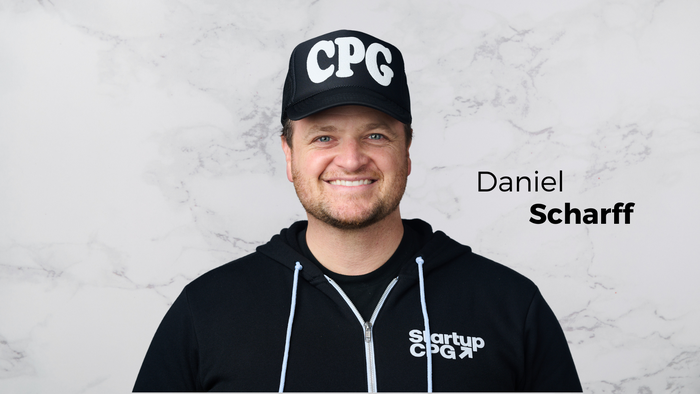How 3 Israeli food-tech founders support their industry during a war
As the Israel-Hamas war continues, these leaders face constantly changing conditions while trying to keep Israel’s food system on track. Take a look at their struggles.
December 18, 2023

War changes everyone. Even in ways that can be hard to see.
Since the bloody Hamas-led attacks on Oct. 7, much of Israel’s food tech community has demonstrated its resilience, sharing posts on LinkedIn that say, “Israeli tech delivers no matter what.”
The slogan has become a rallying cry for both entrepreneurs and investors.
“We know it is crucial in tough times to stay close together,” says Jonathan Berger, CEO of The Kitchen Hub, the food-tech incubator and investment arm of Israeli food giant Strauss Group.
That’s why the slogan was created, Berger says, to help electrify the Israeli food tech community.
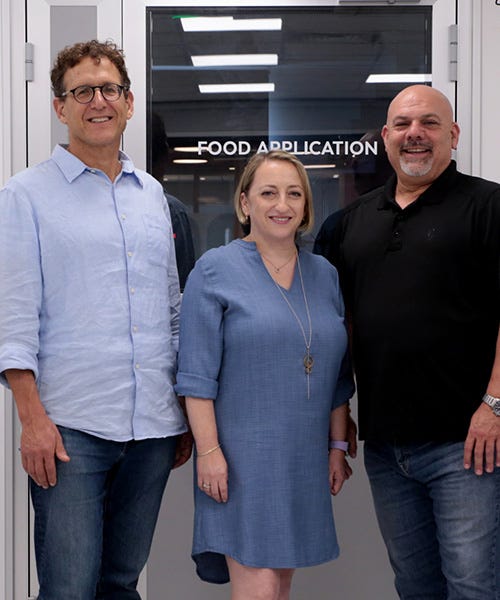
Jonathan Berger, CEO of The Kitchen Hub, left, poses with two of the incubator's staff members. Credit: Jonathan Berger
“The fact that we operate from Israel doesn’t give us a break competing with startups from Silicon Valley, Germany, or from wherever,” Berger says. “The fact that we are going through a tough time is irrelevant to the business. It's our problem. We have to face it and we have to manage it. We have to find a creative solution, and this is what we've been doing.”
While there are many unknowns ahead, one thing is certain: This war will have long-lasting effects on both life and business.
“Most people don’t realize that Oct. 7 is the day most Jewish people were murdered in one day since the Holocaust,” says Gil Horsky, the founding managing partner of FLORA Ventures, an early-stage Tel Aviv-based, $80-million VC fund focused on the agrifood industry. “We need to fight terror. It’s not only an Israeli problem, it’s a global problem.”
There aren’t any easy solutions.
“In a practical manner, we're not going anywhere, and they're not going anywhere,” Horsky says. “In a perfect world, the two parties need to learn how to live together. I don't think there's another choice. But at the moment, with the amount of hatred and aggression, it’s going to be years. The amount of distrust is so big.”
Israel’s giant food-tech market
For years, Israel has been dubbed “the startup nation.”
The nonprofit, Start-Up Nation Central, focuses on climate tech, health tech and agri-food tech helping connecting companies and countries to bolster Israeli innovation. The idea: drive economic growth with entrepreneurialism. According to Startup Savant, more than 6,000 start-up companies operate in Israel. Many are focused on food, agriculture and technology to overcome unfavorable growing conditions, improve the quality and variety of crops, and increase yields through the use of artificial intelligence, robotics and biotechnology.
“Israel has an amazing agri-food tech ecosystem with more than 600 start-ups,” Horsky says. “It’s one of the countries that gets the most funding, globally, for agri-food tech outside of the U.S.”
Over the past two years, alternative protein startups in Israel raised more than $1 billion in funds from venture capital firms, second only to the U.S., according to the Good Food Institute Israel’s State of Alternative Protein Innovation Report. In 2022, Israeli alternative protein companies raised $454 million in funding—15% of all alternative protein investment globally. Those startups include cultivated meat companies such as Aleph Farms and Steakholder Foods and milk and egg alternatives like Remilk and Eggmented Reality.
High-tech funding plunged around the globe in the past year, but Israeli food tech investments fell only 20% year over year, compared to a 42% drop across all tech investments, Good Food Institute Israel reported.
That was before the war.
In the wake of the fighting, Start-up Nation Policy Institute, a nonprofit think tank, and the Israel Innovation Authority, an arm of the Israeli government focused on developing innovation, conducted a preliminary survey on the state of high-tech since the war broke out. The initial findings: More than 80% of the companies reported being harmed by the situation.
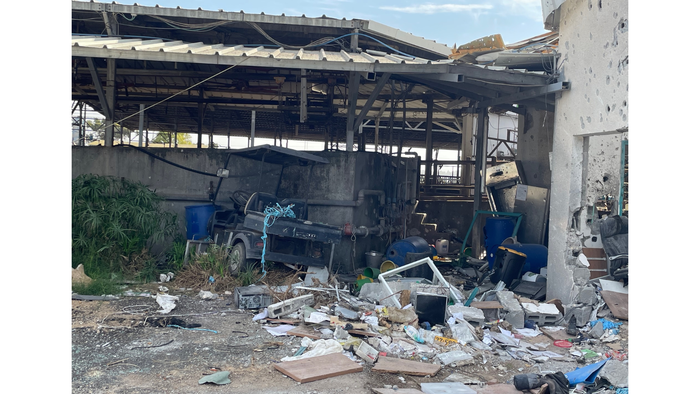
A dairy farm in a kibbutzim was destroyed during Hammas’ Oct. 7 attack on Israel. Credit: Gil Horsky
Collaborative harvesting
For Berger, the new normal has included picking cucumbers in kibbutzim, which are small, collective farming communes.
“I don’t think there’s a person in Israel that’s not volunteering, doing something extra,” Berger says.
With many Thai immigrants who were employed as farmhand labor returning to Thailand or being held as hostages, numerous kibbutz fields and greenhouses that weren’t destroyed need to be harvested.
The messages come on WhatsApp or other social media channels, asking Israelis to volunteer with their family or friends to be laborers and help pick fruits and vegetables, Horsky says.
“You have people from all walks of life from young kids to CEOs of big companies that are taking a day off or the weekend and working in the hot sun,” Horsky says. “I did it myself.”
Keeping operations going
On the day after the Oct. 7 attack, Berger immediately began calling The Kitchen Hub’s 25 portfolio companies.
“We prepared a map of the situation, of how many people were wounded, murdered, killed or missing,” Berger says.
First, they figured out the status of each employee, then every employee’s family. Then Berger began mapping how many people were drafted into service, followed by how many employees had a spouse called to service.
“We had to understand the situation in all the portfolio companies in order to map the needs,” Berger says. “We are a very active investor and very, very involved.”
The Kitchen Hub got the its parent company’s human resources team involved. “And we started to work on solutions,” Berger says. “We were under tremendous shock, and it was very difficult, but we had to continue the operations.”
One person in a portfolio company was murdered, Berger says. Another 30 or so people from all the portfolio companies were called to service, plus numerous employees with a spouse called to service.
“If someone is missing, we are filling in for him or her,” Berger says. “When there is an alarm, we go to the shelter. We stay there for a few minutes, and we go back to our desks.”
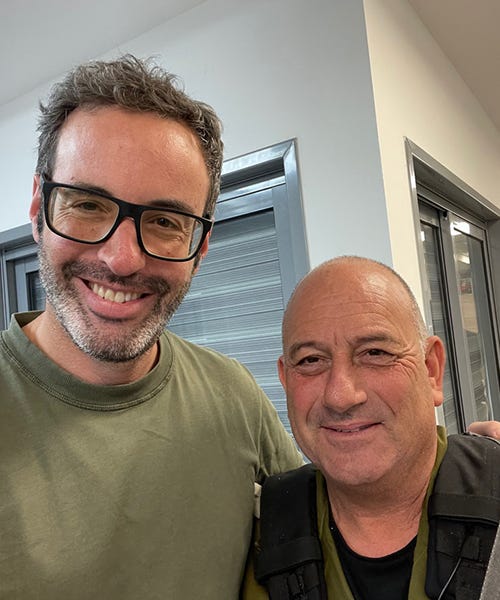
Gil Horsky, co-founder of FLORA Ventures, poses with the head of security in western Negev. Credit: Gill Horsky
With so many people being called into the reserves, many Israeli businesses are facing large voids.
At $80 million, FLORA Ventures is a small fund with three people.
“We have a young analyst who is amazing,” says Horsky, whose small fund employs just three people. The analyst was called into the reserves on the day of the attack and has hardly come back home. “Some companies have 25%-30% in reserves, some have the CEO,” he says. That makes life tough when a loved one is at the border and you’re hardly sleeping.”
Israel is a country of less than 10 million people. “So, everybody has two degrees of separation from somebody that got hurt,” Horsky says.
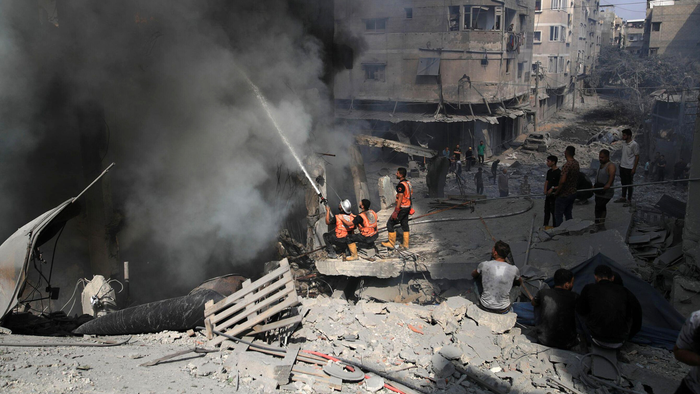
Palestinian men put water on a fire after an Israeli air strike on Oct. 25. Credit: Mohammed Zaanoun/Alamy
Finding a way to work through a war
Working through a war has meant finding creative solutions and unconventional methods to keep production lines running.
“There’s a lot of mobility within the startups, between different team members to support the efforts to make sure there are no delays,” Berger says.
Part of the solution has included bringing in a babysitter to watch children so a mom could go “back to the bench” to work in the lab and take care of the sales, Berger says. It has also meant bringing in students who were about to start at universities to work in the companies and employees taking on extra shifts to hit deadlines.
For Vanilla Vida, a company in The Kitchen’s portfolio that uses patented dry-curing technology to produce vanilla and flavor that is supplied to flavor houses around the world, it meant getting others to do jobs outside of their normal scope of work.
“Even people from the offices that weren’t line workers came to work on the line,” Berger says.
The ability to find creative ways to solve problems—from production to capital raising— has been essential, Berger says.
“If you’re resilient, the most important thing to understand is there aren’t going to be any reductions in expectations,” Berger says, later adding. “Our assumption is there are no reductions on expectations from investors because it’s going to be challenging to convince them to invest in Israel, considering the situation.”
Even before the war, fundraising was already a tough market.
“We don’t have the same pipeline as we did a year and a half or two years ago,” Horsky says. “And now it’s even harder.”
Still, Horsky is quick to point out: “Israelis are extremely resilient people. Yes, we’re all sad. At the same time, we’re all committed to our work, our lives, to stay here, to succeed.”
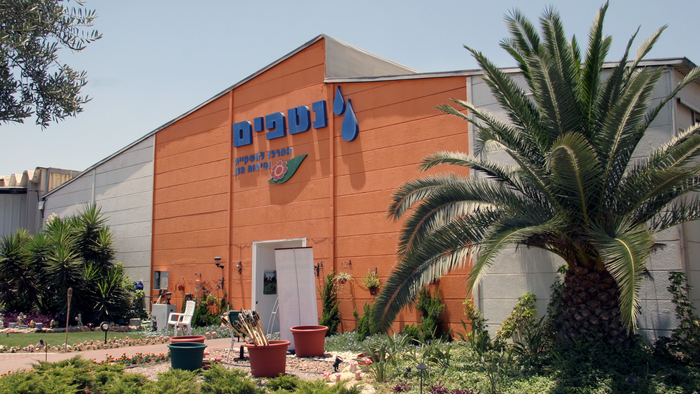
Kibbutz Hatzerim pioneered drip irrigation and founded the agricultural company Netafim. The Netafim company store is pictured. Credit: Alamy
Out of necessity comes innovation
Geographically, Israel is small, slightly larger than the state of New Jersey. “We’re a small country,” Horsky says.
Much like a college town or Silicon Valley where a proliferation of innovation happens because of the proximity of like-minded entrepreneurs who share and discuss ideas, Horsky and Berger say Israel’s tight-knit community and small geographic region has helped foster innovation.
“Practically speaking, we’re like an island,” Berger says. “It’s not like in Europe where food is produced in neighboring countries. Our neighboring countries aren’t friendly, yet, so we have to produce everything ourselves.”
That innovation has been aided by the Israeli Innovation Authority and Israel’s Ministry of Agriculture, which began jointly funding Innovation in Agri-Tech via its pilot programs that allow Israeli technology companies to receive financial support for research and development.
Every few years, the Israeli Innovation Authority strategically targets industries it expects will become big globally and is aligned with Israel’s strengths, Horsky says. It began allocating government funds to incubators, accelerators and startups.
Israel’s great innovations have emerged from the country’s needs, lack of resources and other tribulations.
Much is done in the kibbutzim near the Gaza Strip, one of the most productive, fertile and innovative agricultural areas, Horsky says. Kibbutz Hatzerim, founded in Israel’s southern Negev Desert, pioneered drip irrigation, later founding the agricultural company Netafim, which globally sells drip irrigation equipment to more than 100 countries, and Jojoba Hatzerim, the world’s top jojoba oil manufacturer.
“Israel’s ecosystem of innovation is bred out of lack of what we don’t have,” says Eran Baniel, executive chairman of Incredo LTD, formerly called DouxMatok, which makes the sugar-reducing ingredient Incredo Sugar. “We don’t have water. That’s why Israel is a giant in de-salination technologies, exporting desalinating water for people around the world.”
From this absence, this whole world of security technologies and food tech was born, says Baniel, who co-founded DouxMatok with his late father, Avraham Baniel, a well-known inventor and food scientist who died last year at the age of 103.
In 2020, TIME magazine named the sugar-based engineering for Incredo Sugar—a combination of beet and cane sugar—as one of the top 100 inventions of the year, for its ability to reduce sugar content by 30%-50% while retaining the same level of sweetness. The technology modifies how sugar molecules interact with taste receptors to enhance one’s sense of sweetness.
Baniel’s father made the discovery while experimenting at home.
“My father almost burnt down the kitchen because he didn’t have a lab when he was making the first experiments,” Baniel says. “We had a lady looking after him, making his meals. She called me in a panic and said, ‘I don’t know what your father is doing, but he's burning something in the kitchen. I’m afraid he’s going to burn the whole house down.’”
Baniel drove to Jerusalem in a panic. “That's how I found out for the first time he had this idea of using sugar to reduce sugar,” he says.
Israel’s focus on foodtech came from the need to rethink how things were being done to feed the country’s residents and the world, he says.
“We don't have land, but we have one of the best agricultures in the world,” Baniel says. “The source of what we do, the source of what drives us is the absence. It doesn't come from strength. It comes from trying to make up for weakness.”
Securing a food system
Even before the war, food security in Israel was a big concern.
In November 2022, the Shoresh Institution for Socioeconomic Research released a report detailing Israel’s dependence on international food imports and its high population growth as major threats to its food security, especially when coupled with diminishing natural resources for farmland and water and global factors such as climate change, international conflict and supply chain disruption.
Although Israel’s high-tech industry is 18% of its GDP and 48% of its exports, approximately 91% of its research and development is conducted by the private sector—the highest rate among the 37 countries within the Organization for Economic Co-operation and Development (OECD), according to the Israeli Innovation Authority.
In May, DouxMatok closed a $30 million in a Series C funding round and rebranded as Incredo. Baniel says he’s thankful it was done before the war. “We are lucky,” he says. “We have a fantastic U.S. presence and they’ve taken over.”
These days, Baniel is more concerned by the Israeli-Hamas war, the hostages and what is happening to the country.
“It’s a nightmare,” Baniel says. His focus is on being resilient and surviving.
An alert sounds every time something might explode. A missile. A rocket and mortar attack. That’s when his iPhone starts. His Tzofar – Red Alert app which gives real-time sirens for Israel begins “ringing, shouting,” he says.
“If there’s a missile and something goes wrong with it, we’ve got about 90 seconds from when we first hear the sound,” Baniel says. “We’ve got our stuff ready. We just pick it up and go down the stairs, because you’re not allowed to use the elevator.”
Ideally, they head into a below-ground shelter.
From the third floor of his apartment building, it’s four flights down. Many times, Baniel stays in the staircase, which is made of reinforced concrete.
Trying to pitch potential investors in the middle of a war isn’t easy.
“I had a Zoom with my old Mondelēz team,” says Horsky, former senior director of Mondelēz’s venture investments SnackFutures, about a meeting that happened in early November. “They have an acceleration program with 10 startups for one hour.”
In the middle of that meeting, a Red Alert siren warned of a rocket and missile attack.
“I had to stop and leave for five minutes to go to a shelter,” Horsky says. Once the threat had passed, Horsky returned.
“It’s tough, but we are resilient,” he says. “Historically, we’ve seen in Israel, as in other areas of the world, that out of crisis and wars, as much as it’s horrible, there comes a lot of energy and a lot of desire to rebuild and even rebuild better.”
Right now, that’s difficult for some to envision. “We are in the trenches,” Horsky says. “But I believe, in the end, we will come out stronger of this both as a people and as an ecosystem.”
Many good Israeli entrepreneurs, especially those in agri-food, are tech people who are coming from the military, he says. In the past, many would have founded companies focused on AI, big data or FinTech.
“In the last two years, a lot of them wanted to start doing something more meaningful,” Horsky says.
Many don’t know anything about food and agriculture, but they’re amazing at image recognition, AI and sensors, he says.
They want to know the industry’s pain points and problems to build a company. “A lot of them started coming to agri-food or climate because these are industries with a lot of impacts,” he says.
The Israel-Hamas war will likely only accelerate that.
“Terrible times make us all reflect as people,” Horsky says. “You start asking yourself, ‘What’s important for me, for my family, doing things that are meaningful because I don’t want to waste my life anymore for something that isn’t meaningful.’”
New Hope is interested in talking to additional food tech founders, both Palestinian and Israeli. If you would like to share your story, please email editor@newhope.com.
Correction: This story was updated on Dec. 20 to reflect that fact that an employee of a portfolio company was murdered on Oct. 7.
About the Author
You May Also Like





